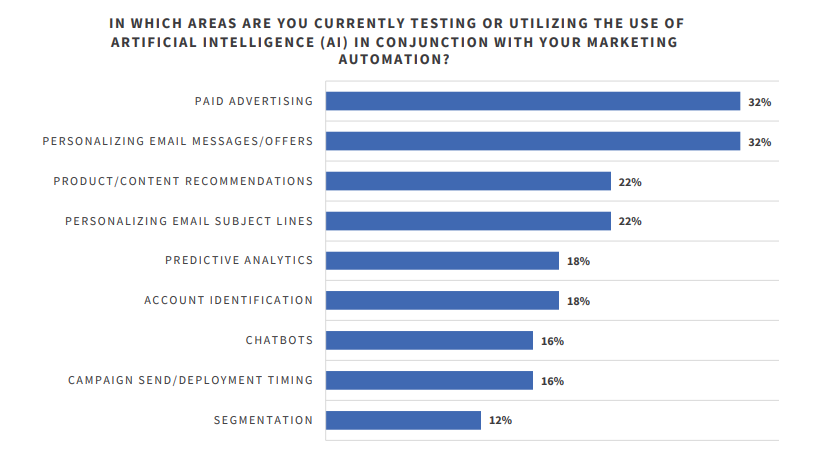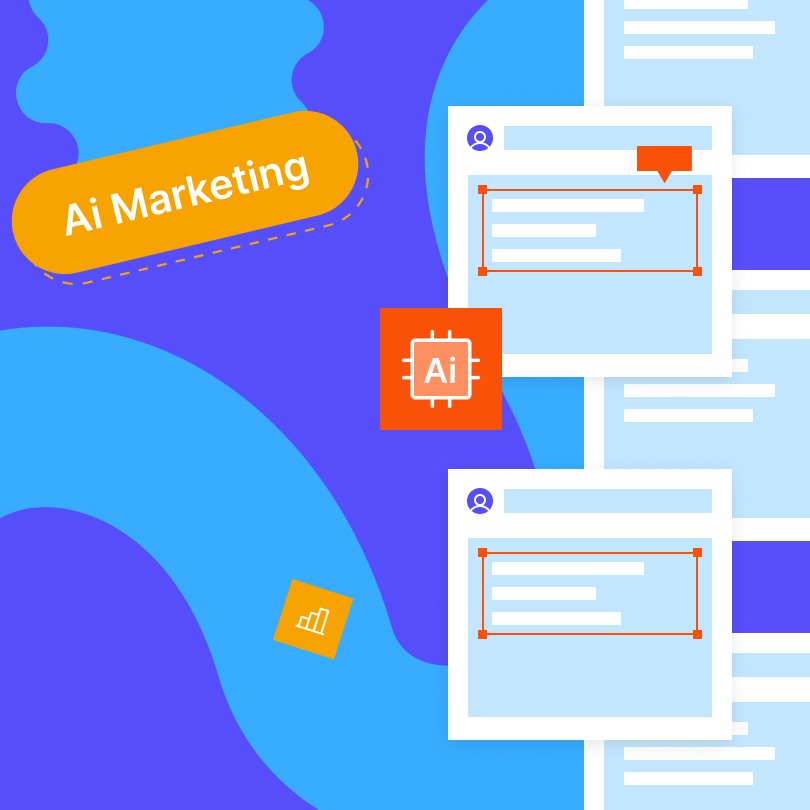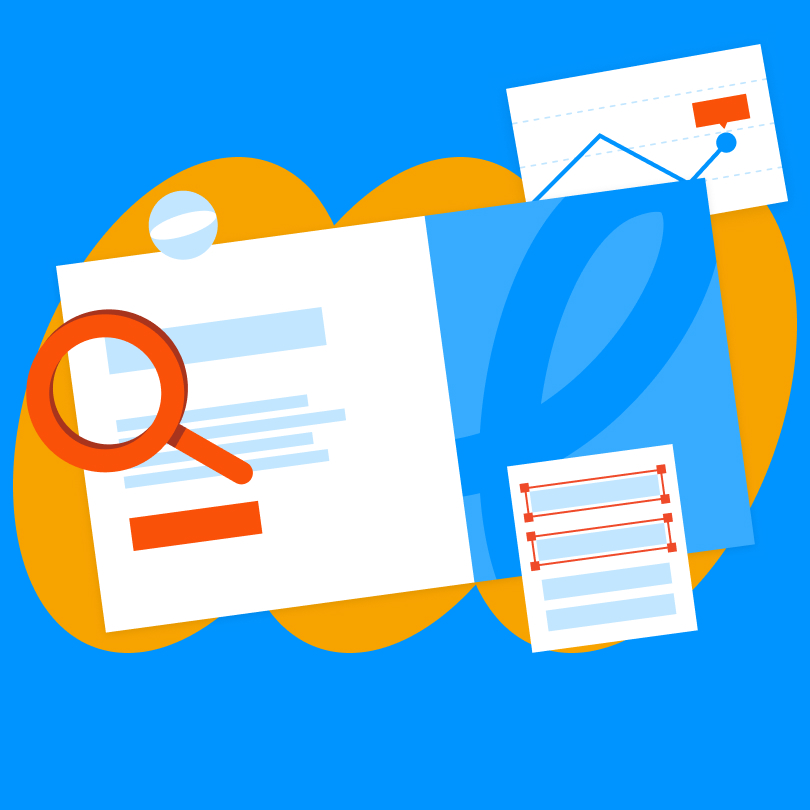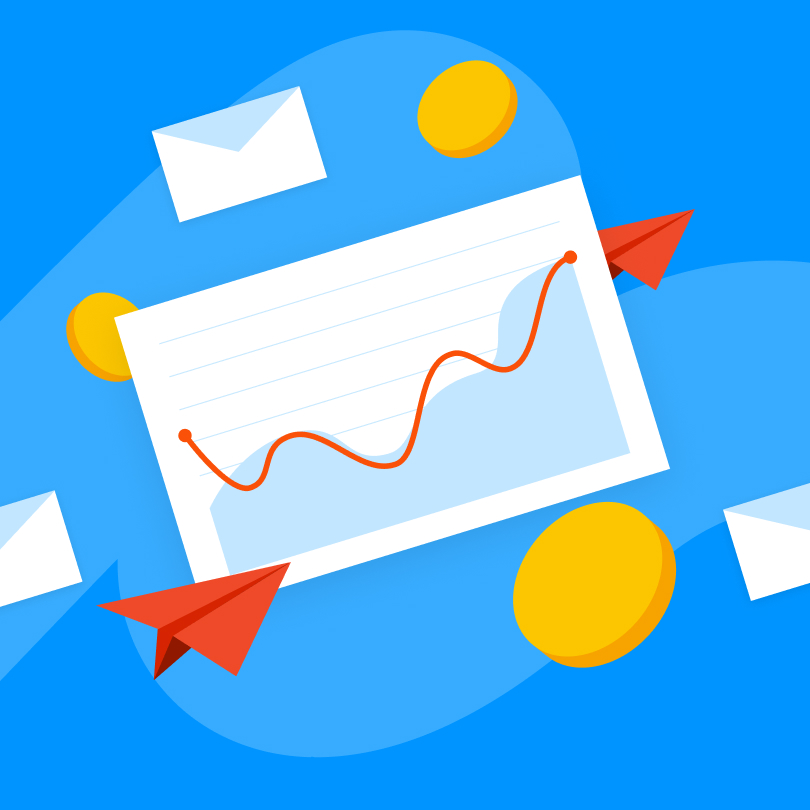How AI in digital marketing will transform the industry? In this article, we look at both the pros and cons of artificial intelligence in the world of digital marketing and aim to predict what the future will look like in the industry.
Some might say that we are finally living in the future, and James Cameron’s Skynet and Watchowskis’ Matrix are only a few years or decades away. Even though AI has been present in digital marketing for years, for most, November of 2022 remains a turning point in the digital world: the introduction of one of the most renowned AI software, ChatGPT.
Ever since its introduction, several digital marketing and IT companies have implemented at least one or two complex AI solutions into their marketing processes, which led to speculations that these programs will eventually replace marketing experts.
Is that true? Let’s see how AI and machine learning in digital marketing will affect the way we market our products and consume marketing materials.
How Is AI Used In Digital Marketing
For the most part, AI and machine learning in digital marketing use complex features such as natural language processing, data collection, analysis, and learning to gain more specific and accurate customer insights to automate certain marketing decisions and tasks.
When talking about the benefits of AI in digital marketing, we can’t discard the fact that these automated and precise processes can help marketers gain better insights into buyer behaviors faster and on a larger scale than before. Harnessing this data can enable them to respond to these behaviors faster and adapt their marketing strategies on the go, as they can make better use of the feedback they receive.
On the other hand, AI in modern digital marketing enables experts to create more personalized campaigns and buyer journeys. Potential and existing customers get more relevant content as they leave their input on websites, ads, or wherever on the digital surface.
To give a much broader picture, AI in digital marketing can help with more effective content marketing, web design and development, graphic design, social media, SEO, PPC, and much more. Still, This doesn’t mean that digital marketing experts and their services will be replaced by software. At the end of the day, AI is a tool. A smart one, but a tool nonetheless. It still requires precise human skill, input, and decision-making to make the most out of it.
AI In Digital Marketing: Exploring The Most Popular Marketing Tools
When it comes to the different AI tools in the industry, it’s no secret that ChatGPT has been the talk of the town. Still, there are a myriad of different solutions that help marketers every day. These pieces of software can help experts with a variety of things, such as design, SEO, marketing automation, and generating content.
To be more precise, here are some of the most-used and effective AI marketing tools:
- Optimove: This is a platform for customer data, offering AI marketing functions.
- Writer: A content generation software with content repurposing functions. It can also double as a writing assistant.
- Manychat: This AI tool uses NLP to react to customer input on different social platforms.
- Jasper: This is a solution that helps generate and optimize content for augmented production.
- Surfer SEO: This is an AI optimization tool that compares and analyzes your pages that rank on the search result pages.
- Zapier: this handy tool helps automate different workflows by connecting the different services and apps a digital marketing agency uses.
- Midjourney: This AI tool can create images from natural language prompts.
- Perplexity: This software is similar to ChatGPT but does a better job at research because it makes better use of web citations.
- Evolve.ai: This solution uses machine learning algorithms and AI to make real-time adjustments, improving customer experiences.
How To Use AI In Digital Marketing
AI delivers capabilities that can be used across almost all digital channels. Most marketing agencies use AI for task and marketing process automation, advertising, and social media campaigns.
Still, it can be used in a myriad of other ways in different industries. For example, a beauty brand may use it to create more tailored customer experiences via a chatbot program that can help with shopping. Publishers and retailers may use it to deliver more accurate advertising to reluctant readers or buyers.
On that note, one of the most successful AI stories belongs to the streaming mogul Netflix. They deploy advanced technology to create more tailored recommendations based on user behavior and preferences.
As time progressed and AI tech became smarter and more accessible, marketers have started using their features to create automated email workflows, generate ads for PPC campaigns, and more.
According to data from last year, 61.4% of marketers have used AI in their marketing processes, and 50% of those asked say inadequate AI adaptation is what keeps them from reaching their marketing goals. According to another source, around 45% of those who used these solutions believe that AI has helped them improve their productivity.

AI In Digital Marketing: Making Good Use of Cutting-Edge Tech
1. Customer Services and Customer Support
Chatbots have been around in digital marketing for a while now and they have proven to be invaluable when it comes to providing information to potential leads and customers. They enable people to get instant answers to simple questions and grant easy and fast brand interaction.
Still, artificial intelligence has an even bigger role when it comes to customer service. It can potentially help improve their experiences as it can also personalize messaging and content and can help streamline purchasing, solve simpler problems, or delegate callers to the right agents or departments.
2. PPC Marketing
PPC or pay-per-click advertising means that you pay a certain amount of money when a user clicks on your ad. PPC advertising is a pivotal strategy for digital marketing agencies as it helps generate more leads and customers via targeted campaigns, granting fast results and a lot of room for optimization and strategy tweaking.
AI can also be very helpful in PPC strategies as well, as software can help optimize
- The pertaining keyword research
- Ad creation
- Targeting and bidding
- Ad placement and scheduling
- Fraud detection
- Predictive analysis
Also, as AI continues to get smarter, marketers will experiment with new targeting strategies, new ad formats, and better metric measuring tools.
3. Image and Content Creation
Those who have worked as graphic designers or content specialists know that there’s often a lot of pressure to create high-quality content quickly for several channels and purposes. No matter how good these experts are, creating anything good will take effort and time, and for the most part, creators often have little time and even fewer resources to come up with something original.
This is why some pieces of software, such as Jasper and ChatGPT, have made such massive waves in digital marketing, as they help people create content fast. From email subject lines to landing pages, ad copy to blog posts, these tools can help you generate anything, greatly decreasing the time required to churn out something fast that can be easily personalized for a wide audience.
In that sense, these tools save both time and money, but there’s a catch – these pieces of software may make mistakes or use poor brand voice, potentially doing more harm than good.
4. SEO
AI also has a huge potential when it comes to SEO. Google and other engines have been using complex algorithms for a while now that crawl and index pages. As AI evolves, it is also becoming even more integrated with the indexing and crawling process, changing how SEO works via SGE or search generative experience.
AI can also improve your keyword research efforts and optimize your content based on data generated from user behavior. It can also improve headings and meta tags. AI can also come in handy in predicting user behavior, trends in SEO, and certain algorithm changes.
Also, as visual and voice search are gaining more ground, the optimization benefits of AI in digital marketing become even more relevant with the help of focusing on long-tail keywords, NLP, relevant image metadata, and more.
5. Email Marketing
Email marketing is still relevant when it comes to turning prospects into engaged customers. As such, AI can help improve your email marketing strategies by optimizing your workflows and saving you time.
To be more specific, AI can help with the following:
- Performance analysis for identifying potential optimization opportunities.
- Creating automated workflows that are triggered by user actions.
- Audience-tailored copy generation.
- Using dynamic content features.
- Personalizing content for a segmented audience.
- Performing more focused and detailed workflow and campaign analysis.
6. Customer Segmentation
Targeting and segmentation can help you influence and identify your most loyal customers. Doing this by hand can be costly and may eat up most of your time.
This is where AI and its sophisticated algorithms come into play: they can segment customers and leads into different groups, enabling you to tailor to their every need.
You can communicate with each of these segments in a way that resonates with them. Furthermore, you can improve your messaging, customer services, and even your products and services based on the segmented feedback you get.
7. Data Analytics
AI not only handles large volumes of data swiftly but also extracts valuable insights, utilizing historical data to predict trends and consumer behaviors.
One essential capability of AI is its proficiency in detecting anomalies and uncovering intricate patterns within datasets. This synergy between AI and data analysis sets the stage for hyper-personalization, allowing marketers to tailor their messaging and approaches with unprecedented precision. In sectors like retail, the application of AI extends to inventory management and optimizing customer service, elevating overall operational efficiency.
With ChatGPT’s Advanced Data Analysis plugin, the power of AI in data analytics becomes even more accessible. By feeding a spreadsheet to ChatGPT, businesses can unveil profound insights, enabling a deeper understanding of the data at hand. This functionality proves invaluable in making informed decisions based on comprehensive data analysis.
AI also plays a pivotal role in refining email marketing strategies. It can curate email lists by assessing metrics and determining the value of each email address or list. By tracking the performance of each email and analyzing frequency, AI provides valuable insights into the effectiveness of the email schedule. This data-driven approach allows marketers to optimize their email campaigns for maximum impact.
All in all, using AI technology in data analysis is not just about managing information overload but about harnessing it to derive actionable business insights. Whether in tailoring marketing strategies, streamlining operations, or refining email campaigns, the integration of AI and data analytics is a dynamic force that empowers businesses to make informed decisions, enhancing overall efficiency and competitiveness in today’s data-centric landscape.
AI In Modern Digital Marketing: The Pros and Cons
While AI offers a myriad of benefits for marketers, there are also possible drawbacks to artificial intelligence. Apart from the question of layoffs in the tech industry, there are also several ethical questions when talking about AI in terms of bias, data privacy, and discrimination.
The Pros Of AI in Digital Marketing
To sum things up, here are what most marketers agree are the benefits of using AI in digital marketing.
- Improved productivity: the ability to automate a variety of tasks and workflows saves a lot of effort and time that can be dedicated to other, more demanding strategic processes.
- Improved efficiency: AI tools can handle repetitive tasks like customer segmentation, basic customer support, and data collection.
- Better ROI: AI can help predict buyer behavior more precisely as it evaluates data. It also improves user experience as it gives users the content they want to get through the buyer journey.
- Content creation and optimization: AI can create compelling content and images at scale, helping speed up creative processes.
- Automation: from automating marketing campaigns and emails to customer segmentation and data entry, along with basic reporting, AI can take over simple routine tasks.
- Insight reveals: There is no guesswork anymore, as AI provides more accurate, data-driven insights, helping marketers make smarter and more precise decisions.
- Predictive analytics: AI can help you predict market trends and customer behavior with the help of historical data, making planning more effective and accurate.
- Hyperpersonalization at scale: With the help of available data, AI can craft personalized content or UX recommendations.
The Possible Drawbacks of AI in Digital Marketing
- Ethics: ethical concerns arise from issues such as the manipulation of user data and behavior, consent concerns, and the unsettling nature of hyper-targeted ads.
- Inaccuracy: errors or inaccuracies within the data can result in flawed analyses, potentially leading to costly business decisions.
- Bias: the effectiveness of AI is contingent on the quality of the data it utilizes, making it susceptible to inherent biases. It is crucial to remain vigilant regarding potential biases related to race, gender, culture, or socioeconomic factors in AI-driven strategies.
- Transparency: with the increasing prevalence of AI-generated content, questions surrounding transparency, plagiarism, authorship, and intellectual property ownership become pertinent concerns in the digital marketing landscape.
- Data sensitivity and security: AI systems often necessitate access to extensive datasets, which may contain sensitive information requiring secure management to safeguard against breaches.
- Job displacement concerns: concerns persist that the widespread adoption of AI in digital marketing may lead to job displacement, raising apprehensions about the potential automation of certain tasks and the impact on employment within the industry.
What Will The Future of Digital Marketing Bring?
As you can see, there are several benefits to using artificial intelligence in digital marketing, but it also raises a lot of questions concerning marketer roles, job security, bias, ethics, and more.
Also, some marketers may still struggle with understanding the role and benefits of AI. For the most part, marketers will probably have to broaden their horizons to learn more about marketing processes and other hard skills to better leverage these AI solutions and remain relevant in the industry.
Learning the basics of data analysis, data management, content personalization, testing, and marketing automation aren’t inherently bad things: these skills can help marketers become not only better experts but more experienced decision-makers. Also, apart from these hard skills, the industry will still require creative thinkers who can leverage the often mundane and commonplace content and imagery that AI sometimes tends to generate.
Most experts will agree that the concerns over AI will mostly be bridged if marketers put in the time and effort to develop the following soft skills apart from the above-mentioned hard ones:
- Innovation
- Agile thinking
- Strategic thinking
- Creativity
Tools Are Just Tools
Even though AI has been around for a long time, and even ChatGPT’s boom was over a year ago, some marketers fear for their jobs because of AI.
However, it’s essential to emphasize that AI, while powerful in automating routine tasks and enhancing efficiency, cannot replace the nuanced, creative, and conscious decision-making abilities of humans. Rather than posing a threat to jobs, AI should be viewed as a valuable tool that complements human expertise, allowing marketers to focus on strategic thinking, innovation, and the uniquely human aspects of creative and empathetic communication. The collaboration between AI and human intelligence holds the potential to elevate the digital marketing landscape, creating a symbiotic relationship that maximizes the strengths of both technology and human ingenuity.





